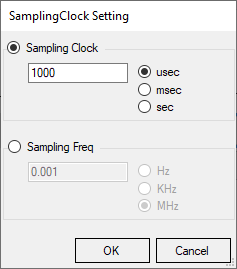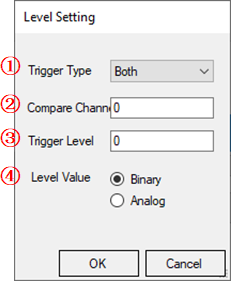
This section describes the AIO device setting screen in Advanced mode.
On this screen, analog input settings, analog output settings, digital filter settings, and sampling settings are possible.
AI Setting tab/AO Setting tab/DIO Setting tab
■AI Setting tab/AO Setting tab/DIO Setting tab
This screen is the same as Basic Mode.
Sampling conditions and data acquisition tervals can be set on this setting tab.
Up to 100 sampling settings (0 to 99) can be created, but only one can be enabled.

①Sampling
Selects whether to enable or disable the sampling function on the selected device.
For the operation when the sampling function is enabled, please see Simple mode and Continuous mode.
②Buffer Over
DncDaq has a buffer for acquiring sampling data for each task No..
When the buffer of a task overflows due to a delay in data linkage,
you can select whether to stop all tasks or stop only the relevant task and continue the operation of other tasks.
③Sampling No.
Indicates the sampling No..
④Sampling Name
The name can be set for each sampling condition.
⑤Clock Type
The sampling clock can be selected from the following.
Internal: Internal clock
ExternalUP: External clock rising edge
ExternalDown: External clock falling edge
The following sampling clock setting screen is displayed only when the internal clock is selected.
It can be set in time unit or frequency unit.

⑥Sampling Clock
Input is possible only when Internal is selected at ⑤clock type.
Sets the sampling clock in usec unit.
It cannot be set to the range that the device does not support.
In addition, even if the device supports it, the maximum sampling clock that can be set is 5 sec.
⑦Input Type
The analog input method can be set from the following.
Volt/Curr: Acquires analog data as voltage and current values. It is possible to measure within the range set in the AI Setting.
Binary: Acquires analog data as a binary value. The range of binary values depends on the resolution of the device.
Sampling start conditions can be set from the following.
If you are using "#sec", you can enter a value in the input field.
Item |
Description |
Auto |
Sampling will start automatically when the app is launched or init. |
#sec |
Sampling will start after the specified seconds have passed after launching the app or init. |
Button_Click |
Starts sampling with the Click event of the Button control. |
Button_Value |
Starts sampling with the OnValueChange event of the Button control. |
Button_Press |
Starts sampling with the Press event of the Button control. |
Ex-UpTrigger |
Sampling starts when the device's external trigger (rising) is detected. |
Ex-DownTrigger |
Sampling starts when the device's external trigger (falling) is detected. |
#Level |
Uses a level trigger. When selected, the level trigger setting screen opens. |
Command |
Starts sampling with the ContinuousModeStart method. |
Edge |
You can use the edge settings set on the DIO device. It is displayed as a combination of device name and edge No.. |
If you are using "#Level", you can set the conditions from the level trigger setting screen.

①Trigger Type: You can select from Up/Down/Both.
②Compare Channel: Specifies the channel used for level comparison.
③Trigger Level: Sets the data for level comparison.
④Level Value: You can select whether to set the trigger level as a binary value or voltage/current.
Sampling stop conditions can be set from the following.
If you are using "#sec", you can enter a value in the input field.
Item |
Description |
None |
Sampling does not stop until the application is closed or Exit. However, sampling can be stopped by the stop method ContinuousModeStop. |
#sec |
After the sampling starts, it will stop after the specified seconds have elapsed. |
#times |
Sampling will end in the specified sampling times. |
Button_Click |
Stops sampling with the Click event of the Button control. |
Button_Value |
Stops sampling with the OnValueChange event of the Button control. |
Button_Press |
Stops sampling with the Press event of the Button control. |
Ex-UpTrigger |
Uses the device's external trigger (rising). |
Ex-DownTrigger |
Uses the device's external trigger (falling). |
#Level |
Uses the level trigger. (The setting screen is the same as the level trigger setting screen for the start trigger.) |
Command |
Stops sampling with the DncDaq component stop method ContinuousModeStop. |
Edge |
You can use the edge settings set on the DIO device. It is displayed as a combination of device name and edge No.. |
⑩Data Store Num
Specifies the sampling times to store sampling data from the device.
In the case of Auto, the data storage cycle is adjusted to 500 msec.
In the case of #num, enter the sampling times to store the data in the data input field.
⑪Data Store Interval
Displays the period for storing sampling data from the device.
This location displays the results calculated from the Data Store Num setting and Sampling Clock.
⑫Buffer Size
Specifies the buffer size for storing sampling data from the device.
This buffer is created only by the number set in the input task settings.
For the relationship between the task buffer and sampling data, please refer to Simple input mode and continuous mode.
⑬Enabled
Select whether to enable or disable the setting.
Only one sampling setting can be enabled for each device.